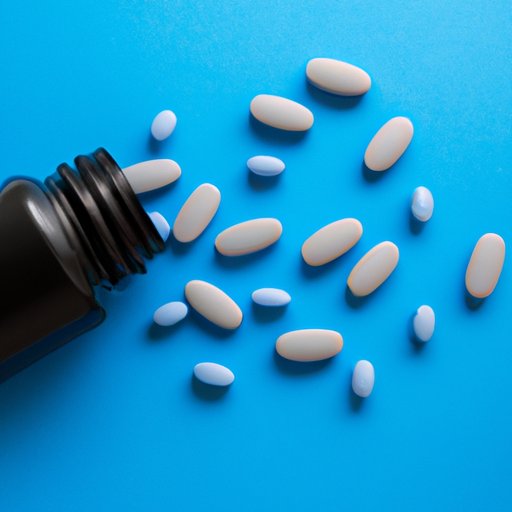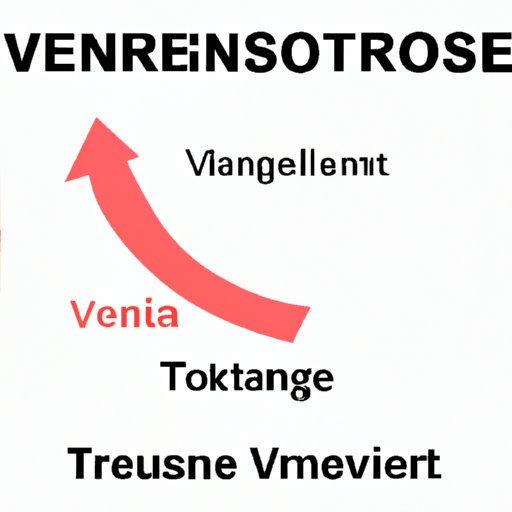
I. Introduction
When it comes to strength and muscle growth, there is no denying the importance of testosterone. This hormone is often associated with masculinity and physical prowess, but how much of that is actually true? In this article, we will explore the science behind testosterone and its impact on strength, as well as its potential risks and benefits for fitness enthusiasts.
II. The Science of Testosterone and Strength: How Hormones Impact Muscle Growth
Before we can understand testosterone’s role in strength and muscle growth, we must first understand hormones and their impact on the body. Hormones are chemical messengers that are produced by glands in the endocrine system. They regulate various functions in the body, including growth, metabolism, and reproduction.
Testosterone is a hormone that is primarily produced in males by the testicles and in females by the ovaries and adrenal glands. Among its many functions, testosterone is responsible for promoting muscle growth and bone density.
Studies have shown that testosterone stimulates protein synthesis, which is the process by which the body builds new muscle mass. Testosterone also increases the production of growth hormone and insulin-like growth factor 1 (IGF-1), both of which play a role in muscle growth.
While women also produce testosterone, their levels are typically much lower than men. In fact, the average male produces around 20 times more testosterone than the average female. This difference in hormone levels can impact muscle growth and strength.
III. Debunking the Myth: Does Testosterone Really Make You Stronger?
It is widely believed that testosterone is responsible for the superior strength and muscle mass of men when compared to women. However, the evidence supporting this belief is not as clear-cut as it may seem.
Several studies have examined the impact of testosterone on strength and muscle growth, but the results have been mixed. Some studies have found a positive correlation between testosterone levels and strength, while others have found no significant impact.
It is important to note that there are many factors that contribute to strength gains, including genetics, exercise, and nutrition. While testosterone may play a role in muscle growth, it is by no means the only factor.
IV. The Role of Testosterone in Athletic Performance and Strength Gains
While testosterone’s impact on strength may not be the sole factor, there is no denying its importance in athletic performance. Several studies have found a correlation between testosterone levels and athletic ability, particularly in sports like weightlifting and sprinting.
Testosterone’s impact on strength gains is also well-documented. One study found that men who received testosterone injections experienced greater increases in muscle mass and strength than those who did not receive the injections.
It is important to note that while testosterone may enhance athletic performance, it is also banned by most sports organizations. Athletes who test positive for elevated levels of testosterone may face disciplinary action, including suspension or disqualification.

V. Maximizing Testosterone Levels Through Diet and Exercise for Increased Strength
While testosterone replacement therapy (discussed in the following section) is an option for those with low levels of testosterone, there are also natural ways to boost testosterone levels.
One way is through diet. Research has shown that diets low in fat and high in protein can help increase testosterone levels. Additionally, consuming foods that are rich in zinc, such as oysters, can also boost testosterone production.
Exercise is also an important factor in testosterone production. Resistance training, in particular, has been shown to increase testosterone levels. However, overtraining can have the opposite effect and lower testosterone levels. It is important to find a balance between exercise and rest for optimal testosterone production.
While there are natural ways to boost testosterone levels, it is important to consult with a healthcare provider before making any significant dietary or exercise changes.
VI. The Potential Risks and Benefits of Testosterone Replacement Therapy for Fitness Enthusiasts
For those with low levels of testosterone, testosterone replacement therapy (TRT) may be recommended. TRT involves supplemental testosterone, either through injections, gels, or patches, to bring levels back to normal.
The potential benefits of TRT include increased muscle mass and strength, improved bone density, and a decreased risk of certain health conditions. However, there are also potential risks associated with TRT, including acne, sleep apnea, and an increased risk of prostate cancer.
TRT is not recommended for everyone, and it is important to consult with a healthcare provider before starting TRT. Those who have had prostate or breast cancer, for example, may not be good candidates for TRT.
VII. Female Athletes and Testosterone: Separating Fact from Fiction
While testosterone is often associated with male athletes, it also plays a role in female athleticism. However, the topic of testosterone levels in female athletes has been a controversial one.
Some female athletes, particularly those in track and field, have been criticized for having elevated levels of testosterone. Critics argue that this gives them an unfair advantage over their competitors.
However, others argue that testosterone levels in female athletes vary widely and are not necessarily a predictor of athletic ability. Additionally, some female athletes with naturally high testosterone levels have been required to undergo medical procedures to lower their hormone levels, a controversial practice known as “sex testing.”
VIII. Beyond Strength: The Other Impacts of Testosterone on Physical and Mental Health
While testosterone’s impact on strength and fitness is important, it also affects overall physical and mental health.
Studies have shown that low levels of testosterone are associated with a wide range of health problems, including decreased bone density, decreased muscle mass, and increased risk of cardiovascular disease.
Testosterone also plays a role in mental health. Low levels of testosterone have been associated with an increased risk of depression and anxiety, while increased levels have been linked to improved mood and cognitive function.
IX. Conclusion
Testosterone is an important hormone when it comes to strength and muscle growth, but it is not the only factor at play. While testosterone replacement therapy is an option for those with low testosterone levels, natural methods such as diet and exercise can also be effective. Testosterone also plays a role in overall physical and mental health, making it an important consideration for fitness enthusiasts.
Ultimately, the impact of testosterone on strength and athleticism is complex and varies from person to person. However, understanding the science behind testosterone and its role in the body can help fitness enthusiasts make informed decisions about their health and fitness goals.





